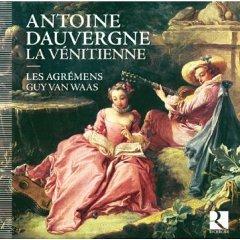Antoine Dauvergne - La Vénitienne (Guy Van Waas) [2012]
Antoine Dauvergne - La Vénitienne (Guy Van Waas) [2012]

Disc 1 1.Ouverture: Presto - Largo - Presto 2.Tendres plaisirs (1. Akt) 3.Quoi? Vous me trahissés, ingrate Léonore! 4.C'est danse les premiers jeux 5.Il me parle à ces jeux - L'amour répond à ses souhaits 6.Non, l'amour ne veut pas que l'on goûte à la fois - Redoublons cependant nos soins 7.De mille amants en vain nous recevons les voeux - Prelude: Cachons-nous 8.Non, ne redoutés plus l'amour 9.D'où viennent ces concerts? 10.Que pour cithere, chacun vienne s'embarquer - Entrée - Très gai 11.Donnés nous des jours fortunés 12.Très marqué et très pointé, sans lenteur 13.Très gai 14.Au plus aimable voyage 15.Menuet 1 - Menuet 2 16.Tambourin 1 - Tambourin 2 17.L'amour nous prèsse 18.Contredanse - Très gaïement 19.Quoi! Toujoûrs de l'amour - L'ingrate! 20.Prelude - Tes pas sont incertains (2. Akt) 21.Pour braver les périls 22.C'est m'offenser que de rien craindre 23.Ciel! il me laîsse, il m'abandonne! 24.Livrons-nous au sommeil 25.J'ai su que mon amant doit se rendre en ces lieux 26.Tu peux dormir, ingrat - Régnés haine, fureur 27.Ah! Quelle est cette voix? Disc 2 1.Prelude - Vous, pour qui l'avenir n'a rien d'impénétrable - Vous croyés me surprendre 2.O vous, qui vivés sous mes lois! - Que tout tremble 3.Grave 4.Noir souverain des ténébreux abîmes 5.Que la guerre en cent lieux répande la terreur 6.Presto 7.Ne suis-je pas déjà dans les sombres Royaumes? 8.Avançons! 9.Quelle horreur! 10.Toi, qui m'as inspirée 11.Prestissimo 12.Quand je revois l'objet de mes amours (3. Akt) 13.Vous réviés seule en ce séjour 14.L'amour coûte trop de soûpirs 15.L'objet qui m'a charmé 16.Je vous revois enfin 17.Mon coeur brûle de mille feux - Mais si mon coeur est tendre - Ah! cachés à ses yeux les beautés 18.N'êtes-vous pas le seul - Ah! c'en est trop 19.Calmés le transport qui vous guide 20.Suivez l'amour, qui vous appelle 21.Air pour les masques - Très gai - Loin de nos jeux, importune sagesse 22.Air pour les polonais 23.Menuet 1 - Menuet 2 24.D'un infidèle enfin, j'ai rallumé la flâme 25.Forlane 1 - Forlane 2 26.Le dieu malin, qui règne dans cithere 27.Air 1 - Mouvement de chaconne 28.Amour, couronne ta victoire 29.Pantomime pour le Tirolois: Andantino 30.Contredanse Chantal Santon, soprano (Isabelle) Katia Vellétaz, soprano (Léonore) Kareen Durand, soprano (Spinette) Isabelle Cals, soprano (Isménide) Mathias Vidal, ténor (Octave) Alain Buet, baryton (Zerbin) Chœur de Chambre de Namur Les Agrémens Guy van Waas – conductor
Antoine Dauvergne’s final operatic work follows none of the established genres of the period. Taking a libretto written during the reign of Louis XIV in 1705, he drew on the best of his talent and skill to create a synthesis of everything that was modern at that time. --- arkivmusic.com
This year is the tercentenary of Antoine Dauvergne (1713-97). From 1744 Rameau’s pupil rose through the ranks of the Académie Royale de Musique (ie the Paris Opéra) and in 1769 was appointed one of its directors. Remembered by historians for his initially reluctant negotiations to bring Gluck to Paris in the early 1770s, Dauvergne’s music was criticised by Burney as ‘very dull and heavy…in the oldest and worst French style’ but his merits are commemorated in timely fashion by two live concert recordings, both made in November 2011 in association with the Centre de Musique Baroque de Versailles.
The libretto of the tragédie lyrique Hercule mourant (1761) by Jean-François Marmontel is influenced by Sophocles’s tale of the jealous Deianira’s inadvertent murder of her husband Hercules. Contemporaries praised the decor of the terrible scene in which Hercules burns on a funeral pyre but sharp division arose over the music: one critic joked that ‘the whole opera ought to be thrown on the pyre in the fifth act’, whereas Dauvergne’s supporters protested it was ‘ingenious, light and stimulating’. Christophe Rousset’s theatrical pacing is spot-on; Les Talens Lyriques are on fine form in the lithe Ouverture; and dances are played with a keen sense of balletic movement. Véronique Gens’s authoritative recitatives convey the swinging emotional fortunes of the anxious Déjanire; her vitriolic reaction to news of Hercule’s secret plan to marry his beautiful captive Ïole brings Act 2 to a strong climax. Ïole’s idyllic pastoral ‘Quelle voix suspend mes alarmes?’ is sung sweetly by Julie Fuchs. Hercules’s bitter shame at his unworthy deceit of his wife at the start of Act 3 is sung commandingly by Andrew Foster-Williams, accompanied by a dark orchestration dominated by bassoons.
Dauvergne’s ill-fated comédie lyrique La vénitienne (1768) was condemned by one cynical eyewitness as ‘a tedious piece of drollery’ but Benoît Dratwicki’s essay claims that it bridges ‘the gap between Rameau and Pergolesi’. The elegant playing of Les Agrémens conveys the opera’s charms; the convivial Ouverture has a beguiling Largo featuring rolling woodwinds and pizzicato strings, whereas the outer quick movements offer shades of Haydn. The light-hearted plot of Venetian lovers reconciled after bizarre escapades warranted a frothy score packed with short tuneful arias (it is hard to spot them in Hercule mourant) and amusing orchestral interludes. The lovely opening scene in which Léonore wistfully wishes that she had sooner known the delights of falling in love (‘Tendres plaisirs’) sets the scene of St Mark’s Square rather less than a pastoral scene straight out of a painting by Fragonard. A chorus of boatmen tenderly implore the Zephyrs who rule the waves to grant days of happiness, thus introducing a divertissement of attractive dances (including a delightful barcarolle). The first scenes of Act 2 contain orchestral passages of mock-serious storminess as the amorous Venetian nobleman Octave and his long-suffering valet Zerbin switch clothes in order to seek counsel from the sorceress Isménide; the fearful Zerbin drinks himself to sleep in an astonishingly gorgeous soft aria (‘Livrons-nous au sommeil’). It is incredible that these dissimilar operas were written by the same composer but each repays investigation. --- David Vickers
download (mp3 @320 kbs):
yandex mediafire uloz.to mega 4shared cloudmailru








